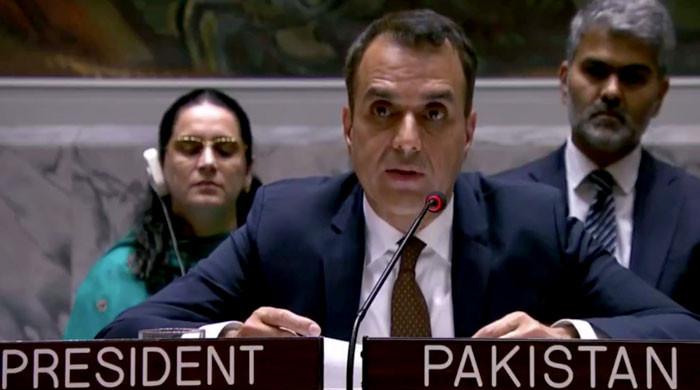Pakistan Rejects Indian Accusations of Terrorism at UNSC
Pakistan has firmly dismissed India’s allegations regarding cross-border terrorism, and has instead called on New Delhi to consider its own conduct rather than placing blame on others.
During a UNSC debate focused on “Promoting International Peace and Security through Multilateralism and Peaceful Settlement of Disputes,” Pakistan’s Deputy Permanent Representative to the UN, Ambassador Usman Jadoon, refuted India’s claims. He urged New Delhi to reassess its behavior, rather than continuing its familiar pattern of portraying itself as a victim and shifting responsibility.
“India actively supports and instigates terrorism within Pakistan and beyond,” Ambassador Usman Jadoon stated to the 15-member council on Tuesday evening, in response to accusations made by India’s UN Ambassador Parvathaneni Harish.
Ambassador Jadoon voiced particular concern that the Indian ambassador targeted Pakistan on Tuesday, especially considering that earlier that day, the Council had unanimously reaffirmed the UN Charter’s objectives and principles, emphasizing the critical need for peaceful conflict resolution, respect for international law, and effective enforcement of Security Council resolutions.
The Indian envoy’s remarks followed a speech by Pakistani Deputy Prime Minister and Foreign Minister Ishaq Dar, who stressed the necessity of resolving the Kashmir dispute. Dar’s speech, delivered in his national capacity, came after the adoption of a Pakistan-sponsored resolution advocating for the peaceful settlement of disputes.
“First and foremost,” the Pakistani envoy declared, “India is illegally occupying the disputed territory of Jammu and Kashmir.”
He further added, “While professing adherence to the UN Charter and the principle of peaceful dispute resolution, India has consistently violated Security Council resolutions on the Jammu & Kashmir dispute. It has refused to implement these resolutions, thereby denying the Kashmiri people their inherent right to self-determination.”
Jadoon emphasized, “India’s severe human rights abuses, extending beyond the occupied territory of Jammu and Kashmir to include its appalling treatment of minorities, have been extensively documented by international human rights organizations.”
He also stated that India has unilaterally and illegally suspended the 1960 Indus Waters Treaty – with the stated goal of depriving Pakistan’s population of water resources from the Indus river system.
“In blatant disregard for international law, India engaged in overt acts of aggression against Pakistan between May 7-10, targeting civilians, including women and children,” the Pakistani envoy asserted, also mentioning Pakistan’s appropriate and proportionate response in self-defense, focusing exclusively on military targets. This resulted in the downing of six Indian aircraft involved in the aggression, in addition to other significant military setbacks for India.
Ambassador Jadoon informed the delegates that hostilities ceased due to Pakistan’s strong position, its responsible approach, and the facilitation efforts of the United States.
The Pakistani envoy observed, “It is deeply ironic that India, having initially brought the Jammu and Kashmir dispute to the UNSC, now refuses to implement the resolutions passed by the Council to peacefully resolve this dispute.”
The Indian envoy, seemingly provoked by the success of Pakistan’s signature event at the Council, alleged that Pakistan was “steeped in fanaticism and terrorism, and a serial borrower from the IMF.”
The debate is set to continue on July 24, after hearing from scores of high-level representatives.
Previously, the UN Security Council unanimously approved a Pakistan-sponsored resolution, urging member states to implement the 15-member body’s resolutions for the peaceful resolution of disputes, exemplified by Kashmir and Palestine.
The UNSC acted on the resolution during a meeting centered on “Maintenance of international peace and security”, highlighting concerning trends involving prolonged and unresolved disputes that jeopardize international peace and security. The resolution called for strengthened collective endeavors to address these issues, marking one of Pakistan’s two signature events during its presidency.
DPM Dar, who traveled to New York specifically for this high-level event, presented the resolution for a vote and then confirmed its adoption.
UN Secretary-General Antonio Guterres, who inaugurated the debate, praised DPM Dar for organizing the debate and using the UNSC’s presidency to introduce a resolution urging all member states to fully utilize the tools available in the collective pursuit of global peace, stating: “This is needed now more than ever.”



Comments (0)
No comments yet. Be the first to comment!
Leave a Comment